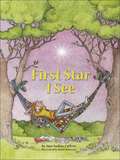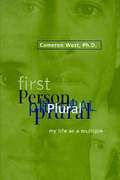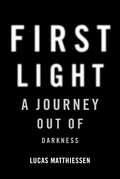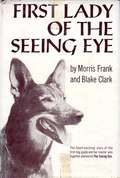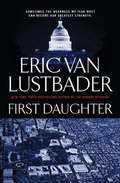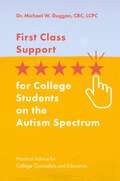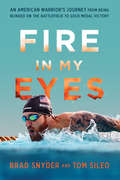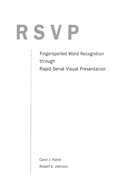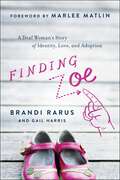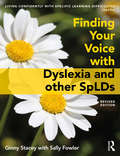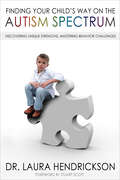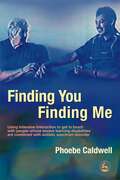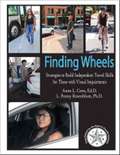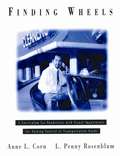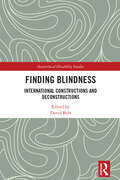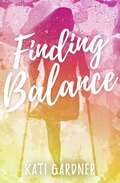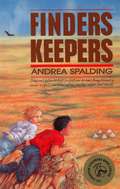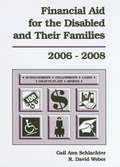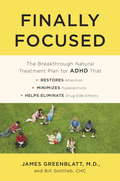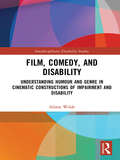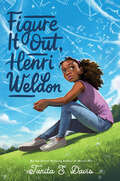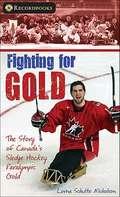- Table View
- List View
First Star I See
by Lynne Adamson Jaye Andras CaffreyA lively, enchanting story that wonderfully captures the daily ups and downs of being a child with attention deficit disorder through the adventures of Paige, a bright young girl whose inability to stay focused threatens to spoil her best efforts to win a school contest.
First Person Plural: My Life As a Multiple
by Cameron West"What the hell's happening to me? I feel possessed. I'm talking gibberish in the mirror and somebody else's voice is coming out of my mouth!" Cameron West was in his thirties, a successful businessman, happily married and the father of a young son, when he spoke these words. The "voice" belonged to Davy. the first of twenty-four distinct personalities to emerge over a period of several months and recount memories of horrific abuse that had been kept secret from West all his life. There was eight-year-old Clay, tense and stuttering; twelve-year-old Dusty, gentle and kind, but disappointed to find herself in the body of a middle-aged man: Bart, lightheaded and supportive; Leif, with his incredible focus and drive, who sometimes overwhelmed West with his demands, and nineteen other personalities-all with distinct characteristics, mannerisms, and memories. In first Person Plural, West offers a poignant account of his efforts to understand the workings of his fragmented mind and to heal his damaged spirit as he desperately hangs on to the slender thread that connects him to his wife, Rikki, his son, Kyle, and some semblance of a regular life. In addition to a spellbinding story. West provides rare and unprecedented insight into the fascinating workings of the mind of a multiple and his alters' coexistence with one another and with those "outside." heart wrenching. humorous, and ultimately hopeful. First Person Plural is a story that will make you stand in awe of the power of the mind to protect itself and cheer for West as he struggles to gain control of his life.
First Light: A Journey Out of Darkness
by Lucas MatthiessenA deeply felt literary memoir of one man&’s journey to redemption through vision loss, alcoholism, and the burden of a family legacy. Born to the author Peter Matthiessen, young Lucas traveled through life believing himself a disappointment to his famous father. From an early age, Lucas was exposed to the fanciful ideas of his parent&’s group of renowned bohemians as well as to their addictive pastimes. Within the shadow of his father&’s professional success came another source of darkness—the deterioration of Lucas&’s vision from retinitis pigmentosa. With blindness looming imminently, Lucas spirals downward, unsure of how to turn his degree in English Literature into a job and relying more and more on alcohol. As Lucas&’ drinking and eyesight worsen, so too do his interpersonal relationships and first career in publishing.First Light is a memoir of loss and learning. By pulling himself out of addiction and accepting that he will lose his sight completely, Lucas transitions from being &“the son of&” someone famous to an individual with his own strong sense of self. Despite continued personal tragedies, Lucas develops a second sight that is aimed inward, laying his triumphs and failures bare.With great honesty, Lucas Matthiessen creates a vivid portrait of self-destruction and rebirth, which is, above all, a vision of hope.
First Lady of the Seeing Eye
by Morris Frank Blake ClarkThis story written by Morris Frank tells of how he trained in Switzerland with Buddy, the first Seeing Eye dog in America. Also tells of the very early history of The Seeing Eye in Morristown N.J. "Here are adventures that encompass thirty years and countless of miles: the fight to have dog guides admitted to restaurants and hotels, trains and planes; lectures and demonstrations all over the country; meetings with millionaires and Presidents--and with mountaineers and truckdrivers; and the humor and pathos of day-to-day events. The story begins on page 11. Un-numbered pages of photos, described and with captions, are between pages 64 and 65.
First Daughter (Jack McClure Series #1)
by Eric Lustbader Eric Van Lustbader<P>Jack McClure has had a troubled life. His dyslexia always made him feel like an outsider. He escaped from an abusive home as a teenager and lived by his wits on the streets of Washington, D.C. It wasn't until he realized that dyslexia gave him the ability to see the world in unique ways that he found success, using this newfound strength to become a top ATF agent. <P>When a terrible accident takes the life of his only daughter, Emma, and his marriage falls apart, Jack blames himself, numbing the pain by submerging himself in work. Then he receives a call from his old friend Edward Carson. Carson is just weeks from taking the reins as president of the United States when his daughter, Alli, is kidnapped. Because Emma McClure was once Alli's best friend, Carson turns to Jack, the one man he can trust to go to any lengths to find his daughter and bring her home safely. <P>The search for Alli leads Jack on a road toward reconciliation... and into the path of a dangerous and calculating man-- someone whose actions are as cold as they are brilliant, and whose power and reach are seemingly infinite. <P>Faith, redemption, and political intrigue play off one another as McClure uses his unique abilities to journey into the twisted mind of a stone-cold genius who is constantly one step ahead of him. Jack will soon discover that this man has affected his life and his country in more ways than he could ever imagine.
First Class Support for College Students on the Autism Spectrum: Practical Advice for College Counselors and Educators
by Michael W. DugganCollege students with autism can face many difficulties during the transition from high school to further education and beyond. Highlighting the various everyday issues that may arise, this book shares practical advice for supporting students on the autism spectrum and helping them to succeed not only academically, but also socially and emotionally. From supporting students with their relationships, to dealing with anxiety and managing independent living, this book covers a breadth of topics. It considers the impact of teaching expectations in higher learning on general adult life, and how to counsel students with autism on academic issues. The author also examines his many years of experience as a community college counselor, sharing the mistakes he has made and the lessons learned, to outline what makes a good counselor and how to take specific steps to ensure success for students with autism in all aspects of college life.
Firesong: A Brightstorm Adventure (Brightstorm Twins #3)
by Vashti HardyIn this spirited third Brightstorm adventure, the twins journey north to protect the legendary earth-bear and to discover their family’s hidden history. Arthur and Maudie Brightstorm are back home in Lontown and finally settling in after their exhilarating—and secret—adventures in Erythea. Maudie’s sky-ak invention is a hit, and Harriet has just announced that she will share her sky-ship’s hydroelectric technology. But tensions are brewing. Pitch is becoming more and more difficult to mine, and the existence of super-sapient creatures on other continents threatens how the Explorers see themselves in the natural order of the world. When Arthur and Maudie begin hearing a strange song summoning them north—a song only they can hear—they know there’s an adventure waiting for them that may change the lives of everyone in the Wide. As the crew of the Aurora prepares for their trip, they’re joined by new members and old friends. But they’re not the only sky-ship journeying northward to uncover the region’s secrets. . . . Return to Vashti Hardy’s “marvelously imagined” world (Publisher's Weekly) in this sweeping and propulsive new addition to the Brightstorm series.
Fire in My Eyes: An American Warrior's Journey from Being Blinded on the Battlefield to Gold Medal Victory
by Brad Snyder Tom Sileo<P>"I am not going to let my blindness build a brick wall around me. I'd give my eyes one hundred times again to have the chance to do what I have done, and what I can still do."-Brad Snyder speaking with First Lady Michelle Obama <P>On the night Osama bin Laden was killed, US Navy Lieutenant Brad Snyder was serving in Afghanistan as an Explosive Ordnance Disposal officer with SEAL Team Ten. When he learned of SEAL Team Six's heroics across the Pakistani border, Brad was thankful. Still, he knew that his dangerous combat deployment would continue. <P>Less than five months later, Brad was engulfed by darkness after a massive blast caused by an enemy improvised explosive device. Suddenly Brad was blind, with vivid dreams serving as painful nightly reminders of his sacrifice. <P>Exactly one year after losing his sight, Brad heard thousands cheer as he stood on a podium in London. Incredibly, Brad had just won a gold medal in swimming at the 2012 Paralympic Games. <P>Fire in My Eyes is the astonishing true story of a wounded veteran who refused to give up. Lieutenant Brad Snyder did not let blindness build a wall around him-through tenacity and courage, he tore it down.
Fingerspelled Word Recognition through Rapid Serial Visual Presentation
by Carol J. Patrie and Robert E. JohnsonRSVP can be used in the classroom or for self-study. Learning and practicing this extensively researched approach is the key to unlocking the mystery of understanding fingerspelling. [Carol J. Patrie, Robert E. Johnson; (2011) Book: 185 pages; soft cover; coil bound, CD-ROM, DVD: 187 minutes; no audio; Mac OS X 10.6; PC Windows 7] Item not returnable once opened. The book explains the form and function for the types of fingerspelling: careful, rapid and lexicalized.
Finding Zoe: A Deaf Woman's Story of Identity, Love, and Adoption
by Brandi Rarus Gail HarrisAt just a few months old, Zoe was gradually losing her hearing. Her adoptive parents loved her—yet agonized—feeling they couldn't handle raising a Deaf child. Would Zoe go back into the welfare system and spend her childhood hoping to find parents willing to adopt her? Or, would she be the long-sought answer to a mother's prayers? Brandi Rarus was just 6 when spinal meningitis took away her hearing. Because she spoke well and easily adjusted to lip reading, she was mainstreamed in school and socialized primarily in the hearing community. Brandi was a popular, happy teen, but being fully part of every conversation was an ongoing struggle. She felt caught between two worlds—the Deaf and the hearing. In college, Brandi embraced Deaf Culture along with the joys of complete and effortless communication with her peers. Brandi went on to become Miss Deaf America in 1988 and served as a spokesperson for her community. It was during her tenure as Miss Deaf America that Brandi met Tim, a leader of the Gallaudet Uprising in support of selecting the university's first Deaf president. The two went on to marry and had three hearing boys—the first non-deaf children born in Tim's family in 125 years. Brandi was incredibly grateful to have her three wonderful sons, but couldn't shake the feeling something was missing. She didn't know that Zoe, a six-month-old Deaf baby girl caught in the foster care system, was desperately in need of a family unafraid of her different needs. Brandi found the answer to her prayers when fate brought her new adopted daughter into her life. Set against the backdrop of Deaf America, Finding Zoe is an uplifting story of hope, adoption, and everyday miracles.
Finding Your Voice with Dyslexia and other SpLDs
by Ginny Stacey Sally FowlerFinding Your Voice with Dyslexia and other SpLDs is an essential guide to living with dyslexia and other specific learning difficulties (SpLDs). The book provides readers with a practical guide to expressing and developing ideas and feelings. Uniquely designed for dyslexic/ SpLD readers, this book discusses how individual people function and will help readers to: •understand how they think•know what they can do to maintain clear thinking•know how they can positively contribute to any situation in which they find themselves.When people with SpLD find their voice, they gain the self-esteem and confidence to tackle all elements of life (study, employment, general living) and to negotiate sucessfully with those around them. The book contains stories, insights, examples, tips and exercises, presented in a user-friendly way throughout. The book has also been designed for non-linear reading and each chapter includes a ‘dipping-in’ section to guide the reader. The book does not have to be read as solid, continuous text from start to finish: it can be read more like a travel guide.As well as providing vital assistance to people with dyslexia and other specific learning difficulties, this book will benefit anyone supporting, living or working with dyslexic/ SpLD people by helping them to understand more about the dyslexic/ SpLD world.
Finding Your Child's Way on the Autism Spectrum: Discovering Unique Strengths, Mastering Behavior Challenges
by Dr. Laura HendricksonIt seems that nearly everyone knows a family with an autism spectrum child. Most recent figures suggest that the prevalence of all autism spectrum disorders in the United States is an astonishing 1% of the population in the United States, translating to twelve million parents and grandparents that are seeking answers. There are many books available on how to cure an autistic preschooler, but none on how to raise one to adulthood. These promised cures raise parents' hopes, but most parents will find that they are dealing with a lifelong challenge no matter what they do. Dr. Laura Hendrickson is a trained psychiatrist, biblical counselor—and the mother of an autistic child. She understands the struggles parents face as they try to communicate with their autism spectrum child and manage behavior challenges. With an approach that is grounded in a deep understanding of the challenges those caring for autism spectrum children face, Finding Your Child's Way on theAutism Spectrum gives the reader sound, practical tools for understanding how to guide an autism spectrum child to function more fully as the person God created them to be.
Finding Your Child's Way on the Autism Spectrum: Discovering Unique Strengths, Mastering Behavior Challenges
by Dr. Laura HendricksonIt seems that nearly everyone knows a family with an autism spectrum child. Most recent figures suggest that the prevalence of all autism spectrum disorders in the United States is an astonishing 1% of the population in the United States, translating to twelve million parents and grandparents that are seeking answers. There are many books available on how to cure an autistic preschooler, but none on how to raise one to adulthood. These promised cures raise parents' hopes, but most parents will find that they are dealing with a lifelong challenge no matter what they do. Dr. Laura Hendrickson is a trained psychiatrist, biblical counselor—and the mother of an autistic child. She understands the struggles parents face as they try to communicate with their autism spectrum child and manage behavior challenges. With an approach that is grounded in a deep understanding of the challenges those caring for autism spectrum children face, Finding Your Child's Way on theAutism Spectrum gives the reader sound, practical tools for understanding how to guide an autism spectrum child to function more fully as the person God created them to be.
Finding You Finding Me: Using Intensive Interaction to get in touch with people whose severe learning disabilities are combined with autistic spectrum disorder
by Phoebe CaldwellPhoebe Caldwell's remarkable new book makes accessible for the first time the complex, intricate inner and sensory worlds of people whose learning disabilities are combined with autistic spectrum disorder and, often, difficult-to-manage behaviour. Based on many years of working with such people, many of whom have withdrawn into a world of their own, she explores the different sensory reality they experience, showing it to be infinitely more complex and varied than is widely understood. She introduces a practical approach known as Intensive Interaction, which uses the body language of such people - who have hitherto largely been regarded as unreachable - to get in touch with them, giving them a way of expressing themselves which shifts their attention from solitary self-stimulation to shared activity. The outcome is not only a marked improvement in behaviour and ability to communicate but, more important, many parents will say 'they are just much happier'. Covering not only the practical aspects of introducing this technique, but also the thinking behind it, this landmark book has much to say on behalf of a group that has in the past largely been denied a voice, and will open new avenues for both practice and research. It is invaluable for parents, carers, and all who work with this group.
Finding Wheels: Strategies to Build Independent Travel Skills for Those With Visual Impairments
by L. Penny Rosenblum Anne Corn Ed.D.Young adults with visual impairments, who are largely the focus of Finding Wheels, have much to figure out about how they will get from place to place as they seek greater independence and autonomy. In the book, the authors have identified and put into very practical terms the many strategies that nondrivers and low vision drivers can employ. Whether it is driving a car with low vision aids, using public transportation, or negotiating a ride with others in a mutually beneficial way, Finding Wheels informs and empowers travelers to take charge of their own transportation strategies. Families and professionals alike will find this update of Finding Wheels to be the definitive resource on helping youth and young adults maximize their independence in meeting their transportation needs.
Finding Wheels: A Curriculum for Nondrivers with Visual Impairments for Gaining Control of Transportation Needs
by Anne L. Corn L. Penny RosenblumThis text comprises explanatory material, activities, and numerous case studies profiling individuals and their families. The goal is to help visual impaired adolescents come to terms with the practical difficulties, the emotional obstacles, and the serious consequences of their attitudes toward getting around. Annotation c. Book News, Inc., Portland, OR (booknews.com)
Finding Blindness: International Constructions and Deconstructions (Autocritical Disability Studies)
by David BoltThis edited volume explores blindness as a construct with which we the contributors engage as part of our social existence and/or academic research. Irrespective of eye conditions, or the lack thereof, blindness is an understanding at which we have all come to arrive. On the way to this conceptual point, which is in any case unlikely ever to be fixed, we have passed or visited many formative cultural stations.In the terms of autocritical disability studies (i.e. an explicitly embodied development of critical disability studies), these cultural stations include key moments in education and training; the reflective pursuits of philosophy, aesthetics, and cultural theory; literary works such as autobiography, novels, short stories, drama, and poetry; visual texts ranging from photography to postage stamps; technological developments like television, computer applications, and social media; value systems defined by family and/or religion; and the social phenomenon of hate and war. Each chapter in this volume engages with two of these cultural stations; some ostensibly if not profoundly positive or indeed negative, some that contradict each other within and across chapters.This book will be of interest to all scholars and students of disability studies, sociology, education and health.
Finding Balance
by Kati GardnerJase Ellison doesnt remember having acute lymphocytic leukemia when he was three years old. His cancer diagnosis only enters his mind twice a year. Once at his yearly checkup at the oncology clinic and one when he attends Camp Chemo in the summer. No one in his real life knows about his past, especially his friends at Atlanta West Prep. <p><p>Mari Manos has never been able to hide her cancer survivorship. She wakes every morning, grabs her pink forearm clip crutches, and starts her day. Mari loves Camp Chemowhere, where she developed a healthy crush on fellow camper Jase. At Camp, she knows that shell never get the look or have to explain her amputation to anyone. <p><p>Jase wants to move on, to never reveal his past. But when Mari transfers to his school, he knows she could blow his cover. Thats the last thing he wants, but he also cannot ignore his attraction to her. <p><p>Mari wants to be looked at like a girl, a person, and not only known for her disability. But how do you move on from cancer when the world wont let you?
Finders Keepers
by Andrea Spalding1996 Sheila A. Egoff Children’s Literature Prize — Shortlisted 1996 Violet Downey IODE Book Award — Shortlisted 1997 Silver Birch Award — Shortlisted It all started with an ancient arrowhead in an Alberta field. While walking through a field, Danny finds an 8,000-year-old arrowhead. After he shows his friend Joshua, who lives on the Peigan reserve at Head-Smashed-In Buffalo Jump, the two go on buffalo hunts, powwows, archaeological digs, and break in to the local museum. Grappling with dyslexia and unsure of his place in the world, Danny follows the arrowhead into a distant past and back again as he learns about himself and the people who came before him.
Financial Aid for the Disabled and Their Families 2006-2008
by R. David Weber Gail Ann SchlachterBillions of dollars in financial aid have been set aside for America's largest minority: the more than 50 million Americans with disabilities and members of their families. In fact, more money is available today than ever before! This funding is open to applicants at any level (high school through postdoctorate and professional) for study, research, travel, training, career development, assistive technology, specially-adapted housing, tax relief, and many other purposes.
Finally Focused: The Breakthrough Natural Treatment Plan for ADHD That Restores Attention, Minimizes Hyperactivity, and Helps Eliminate Drug Side Effects
by Bill Gottlieb James GreenblattDISCOVER THE ADHD SOLUTION FOR YOUR CHILDDr. James Greenblatt has seen thousands of children and adults struggling with the symptoms of ADHD – hyperactivity, inattentiveness, impulsiveness, and often irritability and combativeness. Rather than simply prescribing medication for their ADHD symptoms, he tailors remedies to his patients’ individual needs, detecting and treating the underlying causes of the disorder. Finally Focused provides proven natural and medical methods to easily treat problems such as nutritional deficiencies or excesses, dysbiosis (a microbial imbalance inside the body), sleeping difficulties, and food allergies, all of which surprisingly can cause or worsen the symptoms of ADHD. Using Dr. Greenblatt’s effective Plus-Minus Healing Plan, parents will first understand the reasons behind their child's symptoms, and then be able to eliminate them by addressing the child’s unique pattern of biological weakness. Adults with ADHD can do the same for themselves. And if conventional medication is still necessary, this integrative approach will minimize or even eliminate troublesome side effects. Using Dr. Greenblatt’s expert advice, millions of children and adults with ADHD finally will get the help they need to achieve true wellness.
Film, Comedy, And Disability: Understanding Humour And Genre In Cinematic Constructions Of Impairment And Disability (Interdisciplinary Disability Studies)
by Alison WildeThis book has been written in an effort to discern some of the limits to representation for portrayals of disability in media, focussing on what is attributable to cinema as a specific medium.1 I will show that there is much understanding to be gained from a synthesis of Disability Studies
Figure It Out, Henri Weldon
by Tanita S. DavisTanita S. Davis, author of Partly Cloudy and Serena Says, has written another funny, warm story featuring middle school and family life—all about the complex calculations it takes for everyone to balance the equations of their lives and what it takes to be part of a team while handling a learning disability. This middle grade novel is perfect for fans of From the Desk of Zoe Washington and A Good Kind of Trouble.Seventh grader Henrietta Weldon gets to switch schools—finally! She’ll be “mainstreaming” into public school, leaving her special education school behind. She can’t wait for her new schedule, new friends, and new classes.Henri’s dyscalculia, a learning disability that makes math challenging to process and understand, is what she expects to give her problems. What she doesn’t expect is a family feud with her sister over her new friends, joining the girls’ soccer team, and discovering poetry. Henri’s tutor and new friend, Vinnie, reminds her to take it slow. One problem at a time.If Henri Weldon has twenty-four hours in a day, and she has two siblings who dislike her four new friends, two hours of soccer practice, seven hours of classes, and three hours of homework . . . she has:A. No free timeB. No idea how to make everyone happyC. No time to figure it out, Henri Weldon!
Fighting for Gold: The Story of Canada's Sledge Hockey Paralympic Gold
by Lorna Schultz NicholsonCanada is recognized as a leader in men's and women's hockey - but in 2006 Canada had yet to conquer the world of sledge hockey, the Paralympic version of ice hockey played by athletes with a physical disability in the lower part of the body.
